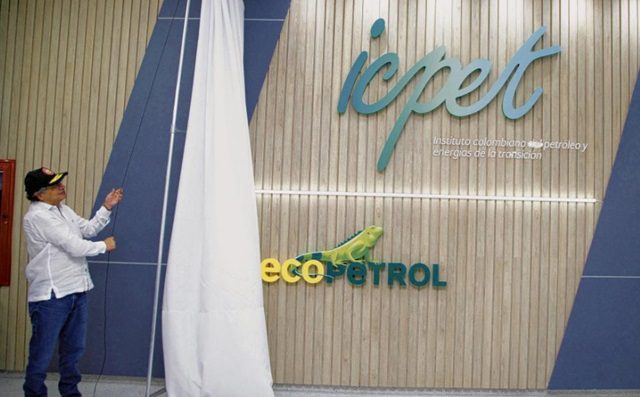BTN News: In what initially seemed like a celebration of progress, the launch of the Colombian Institute of Petroleum and Transition Energies on July 31st was marked by a stark contrast between optimistic aspirations and a dramatic turn of events. The new entity, based in Piedecuesta, Santander, near Bucaramanga, replaced the former Colombian Petroleum Institute and was poised to play a pivotal role in steering the country towards innovative energy solutions. The occasion was graced by the President of Colombia, whose presence underscored the significance of the shift towards renewable energies, hydrogen projects, and low-emission solutions, as emphasized in a statement from Ecopetrol, which committed close to 200 million dollars for this initiative between 2024 and 2030. However, behind the scenes, a significant opportunity slipped away, leaving Ecopetrol and the nation questioning the future direction of its energy sector.
As the President arrived late and delivered a lengthy speech, the mood among Ecopetrol’s top executives grew tense. The President, instead of endorsing a meticulously analyzed and internally approved investment plan, expressed outright opposition. This investment, known as the ‘Oslo Project,’ involved acquiring a 30% stake in the assets of a U.S. firm through a subsidiary. The deal promised to enhance Ecopetrol’s production by 9% in 2025, adding approximately 65,000 barrels of crude oil per day, while also boosting the company’s recoverable reserves by a similar percentage. Financially, it was projected to increase Ecopetrol’s net profits by 14% in the coming year, contributing an extra 1.3 to 1.6 billion pesos to the national treasury through taxes and dividends annually.
Despite the strategic benefits, the President’s vehement opposition, rooted in the government’s stance against hydraulic fracturing, or fracking, led to the abandonment of the project. Fracking, a method of extracting hydrocarbons by injecting high-pressure liquids into underground rock formations, has long been a point of contention. While some argue that scientific evidence disproves claims of seismic risks and water contamination, the technique remains banned in many regions and controversial globally. Ecopetrol’s potential investment was particularly sensitive given the administration’s suspension of fracking pilot projects in Colombia and its push for legislative prohibition of the practice.
The implications of this decision are profound. Ecopetrol, which had secured full financing for the acquisition through bridge loans, now faces an uncertain future. The ‘Oslo Project’ would have allowed the company to quickly capitalize on identified deposits, particularly in Texas, where environmental concerns were notably lower compared to Colombian operations. With the project now shelved, Ecopetrol not only misses out on immediate financial gains but also on the chance to strengthen its long-term financial stability, crucial for its transition towards renewable energy.
Internally, the decision has sown discord and uncertainty within Ecopetrol. Many employees, frustrated by the sudden shift in direction and the loss of a lucrative opportunity, are contemplating leaving the company. The disconnect between the President’s vision for the country’s energy future and the company’s current trajectory is becoming increasingly evident. While the President advocates for an accelerated transition to renewable energy, including the electrification of Colombia’s economy and the development of clean power sources, the reality is far more complex.
Globally, the demand for fossil fuels remains robust. Despite initiatives to reduce carbon emissions, coal production hit a record 8.5 billion metric tons last year, driven by rising consumption in Asia. Similarly, oil demand is expected to peak between 2034 and 2040, depending on the adoption rate of electric vehicles. Meanwhile, alternatives like hydrogen, once hailed as the future of clean energy, are facing significant challenges, particularly in terms of production costs and infrastructure development.
Ecopetrol now finds itself at a crossroads, constrained by government mandates to shift away from fossil fuels while lacking the legal framework to fully engage in electricity generation. Even if such authorization were granted, the profitability of electricity generation is significantly lower than that of traditional oil and gas operations. This dilemma threatens not only the company’s financial health but also Colombia’s energy sovereignty, as the country could become increasingly reliant on imported hydrocarbons.
The situation is further exacerbated by concerns over the governance of Ecopetrol. The company’s board, theoretically composed of independent members, is seen as heavily influenced by the government, prioritizing ideological agendas over sound business decisions. This politicization of corporate governance raises alarms about the long-term viability of Ecopetrol and the stewardship of Colombia’s most valuable public asset.
As the global energy landscape evolves, the decisions made today will have lasting impacts. Ecopetrol, under the current administration, may be steered towards a path that jeopardizes its financial stability and its ability to contribute meaningfully to the country’s energy transition. The missed opportunity with the ‘Oslo Project’ serves as a cautionary tale of how political decisions can undermine strategic business initiatives, potentially costing the nation billions in lost revenue and weakening its position in the global energy market.
In the end, while the vision of a cleaner, more sustainable future is compelling, it must be balanced with pragmatic considerations. The abrupt dismissal of a well-conceived investment opportunity could lead to long-term consequences for Ecopetrol and the broader Colombian economy. As the energy transition unfolds, it remains to be seen whether the current administration’s approach will enable Colombia to navigate these challenges successfully or push the country towards a precarious economic and energy future.


